The subtleties of choosing paint for the barbecue
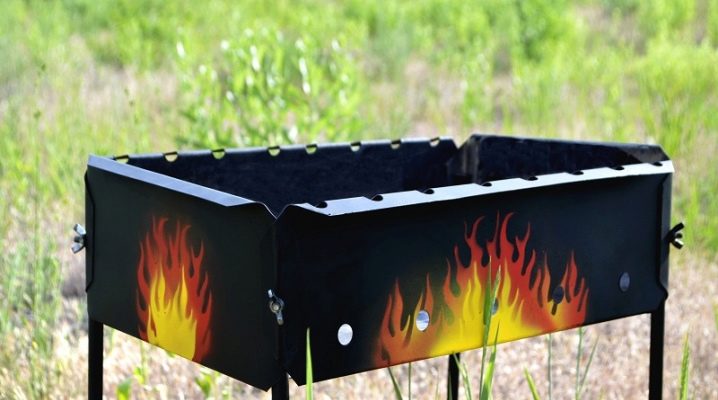
Sooner or later, every owner of a barbecue is faced with the need to paint it in order to be able to protect it from adverse weather conditions and extend the service life of the product. This issue is especially relevant for home-made, forged structures operated in the open air, or for braziers with traces of metal corrosion that have appeared.
The choice of coloring compositions must be approached with all seriousness., because they must ensure not only the protection and durability of the device, but also comply with all safety standards for the human condition.
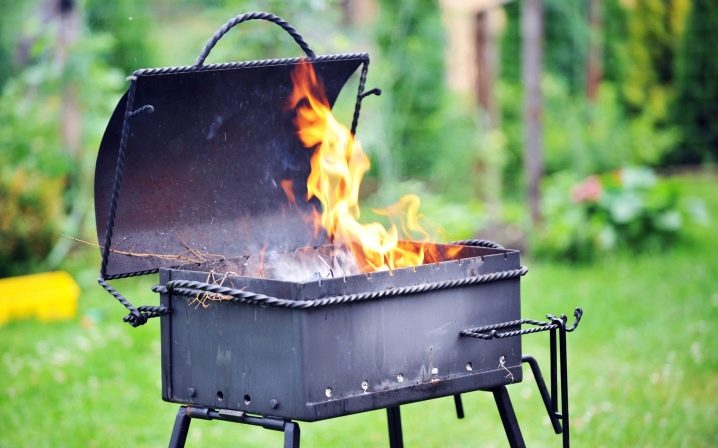
Choice of paint
In order not to endanger your health, it is better to give preference to special high-temperature formulations.
They are required to meet certain requirements.
- The paint must have high refractoriness, the ability to withstand temperatures up to 1000 degrees, and at the same time it must not melt. Such a heat-resistant and fire-resistant thermal paint is more reliable.
- When heated, the release of toxic and toxic substances is unacceptable.
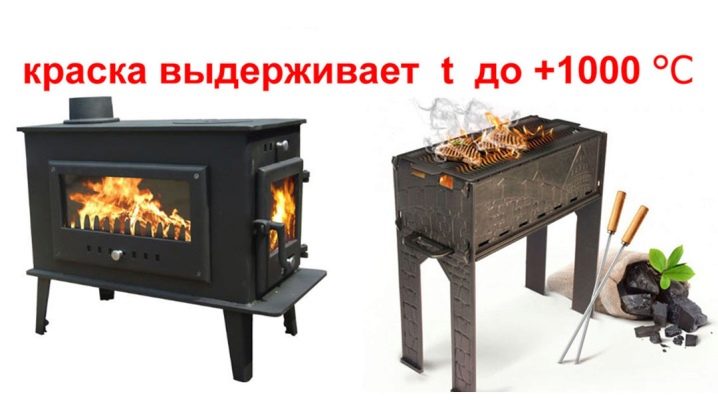
- The occurrence of any chemical reactions when interacting with any materials used is unacceptable.
- Reliable protection of the metal must be provided against any negative phenomena: a sharp change in temperature or humidity, rain or snow falling on a hot surface.
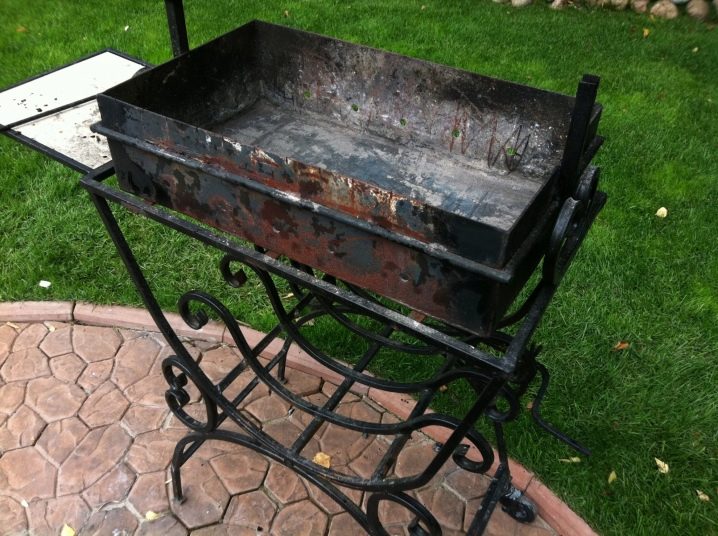
Heat-resistant paint specially designed for painting stoves, fireplaces or barbecues, meets all of the above requirements. Having in its composition special anti-corrosion components, it helps to ensure reliable protection of the metal product. The composition will not harm health, therefore it can be used both in external works and for painting the inner surface. Numerous laboratory studies have confirmed the absence of emissions of toxic substances during the operation of installations painted with such compositions.
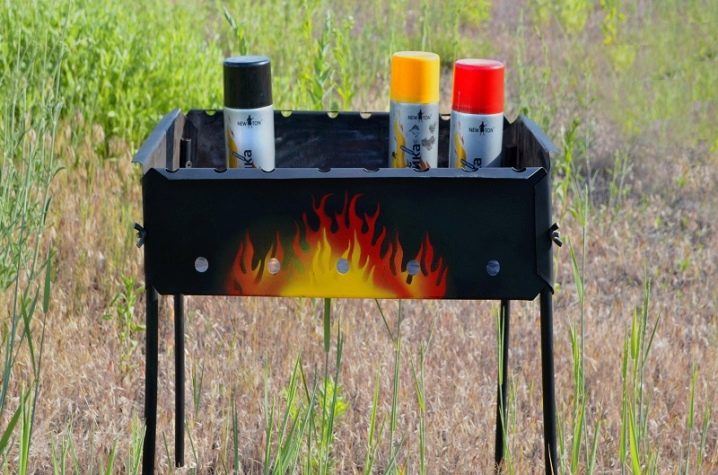
Most often, the owners paint the braziers black or gray so that soot and other contaminants are less noticeable. But if you want to do something unusual, bright and individual, a large color palette of produced heat-resistant paints can help to make any fantasy come true. The consistency of such coloring compositions can be of two types: liquid and dry powdery.
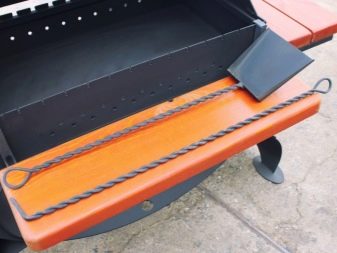
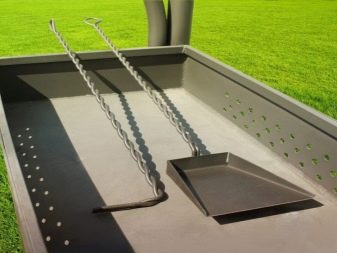
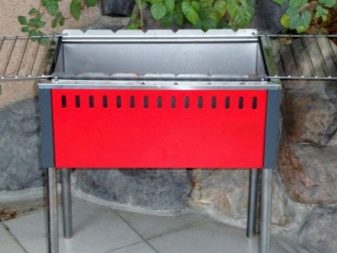
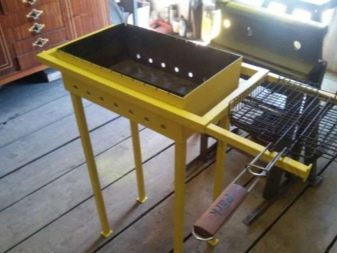
Liquid heat-resistant paints
When using liquid paint, you must first treat the surface to be painted with a special primer. As a result, better adhesion of paint to metal is provided. In addition, the quality of the painted surface is improved, which ensures greater reliability and durability of the coating.
It should be borne in mind that the usual primer is not suitable in this case. It does not have increased elasticity, which means it will crack during operation.
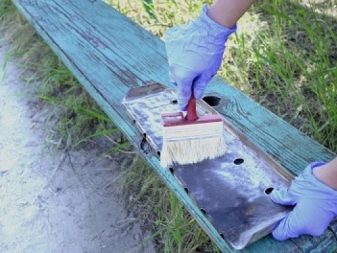
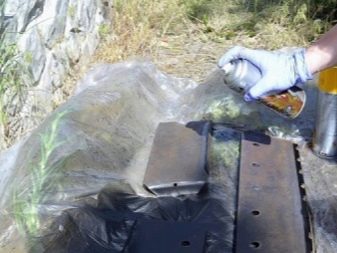
Dry powder paints
Heat-resistant glass and some composite materials are added to the composition of such mixtures. Subject to the correct technology of their application, a resistant coating is created that can withstand temperatures up to +1000 degrees Celsius.
Such paints differ from all others in the way they are applied to the painted surface. The powder is evenly sprayed over the surface of the product, after which it is loaded into a special oven, where the paint is sintered under the influence of high temperatures. As a result, it acquires special properties, including increased heat resistance. This method is more suitable for industrial painting, as it requires special high-temperature drying equipment and ovens.
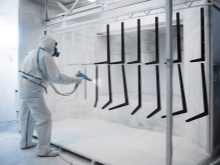
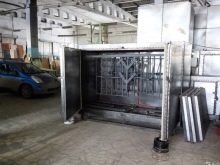
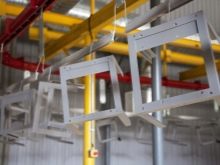
Types of heat-resistant paints and varnishes
At present, the range of heat-resistant paints produced by various manufacturers is small, since only a small amount of substances can protect surfaces from high temperatures. Depending on the chemical composition, such paints and varnishes can be divided into several types. The most popular of these are organosilicon and acrylic compounds.
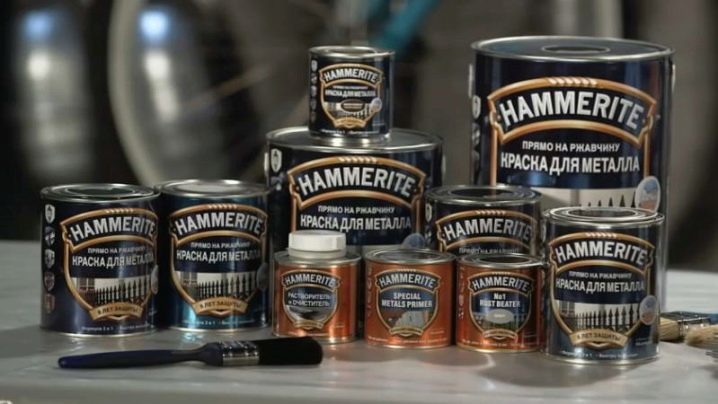
Organosilicon enamels and varnishes
Designed to paint and protect metal surfaces, which during operation are exposed to temperatures from -60 to +500 degrees Celsius.
These paints and varnishes have a number of features.
- They are a mixture of solvent, dyes, targeted additives and varnish based on silicone resin.
- Protects metal from corrosion. Increase moisture resistance, increase resistance to acids, salts, oils and petroleum products, which are part of fluids for quick ignition.
- Suitable for painting surfaces made of bricks, concrete, asbestos-cement and plaster.
- Basic colors: black, gray, white, brown and red.

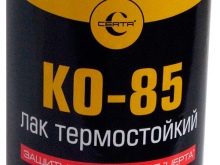
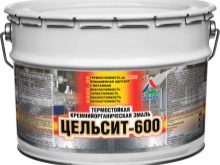
If you want to improve the appearance of the brickwork of an outdoor stove or brazier, then the best recommendation would be to use organosilicon enamel for this.
One of the most significant drawbacks is the very strong odor of the coloring compositions. Therefore, it is best to work with these types of heat resistant paints outdoors or in well ventilated areas.
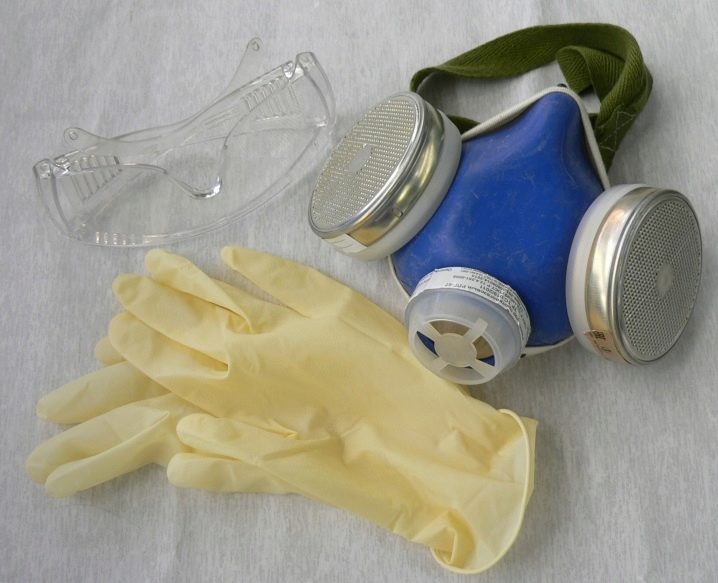
Acrylic paints
Special formulations based on acrylic resin are gaining more and more popularity with consumers. This is especially true for formulations produced in the form of aerosols. They are very easy to use, have improved performance, abrasion resistance and a short drying time.
Acrylic compounds freely withstand constant operating temperatures up to +600 degrees Celsius and even their short-term rise to +800 degrees. It should be borne in mind that enamels acquire heat resistance immediately after the first heating to temperatures from +180 to 220 degrees, if it lasts for at least 15 minutes. Prior to this, partial shedding of the paint layer is possible.
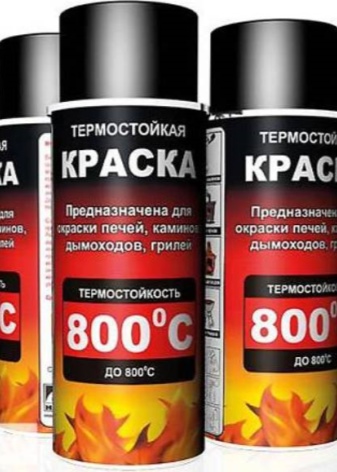
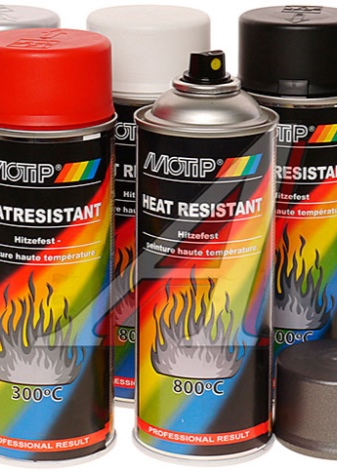
Among the features of this type of paint and varnish coatings, several can be distinguished.
- In addition to acrylic resin, there are fillers in the form of glass, mineral or aluminum powders, color dyes and additives with protective properties. Manufacturers use liquefied gases as solvents: propane, butane, light oil fractions. Thanks to this, the applied paint dries up within 10-15 minutes.
- Acrylic paints have excellent adhesion to non-ferrous and ferrous metal surfaces.
- They are very easy to use, allowing you to do all the work yourself.
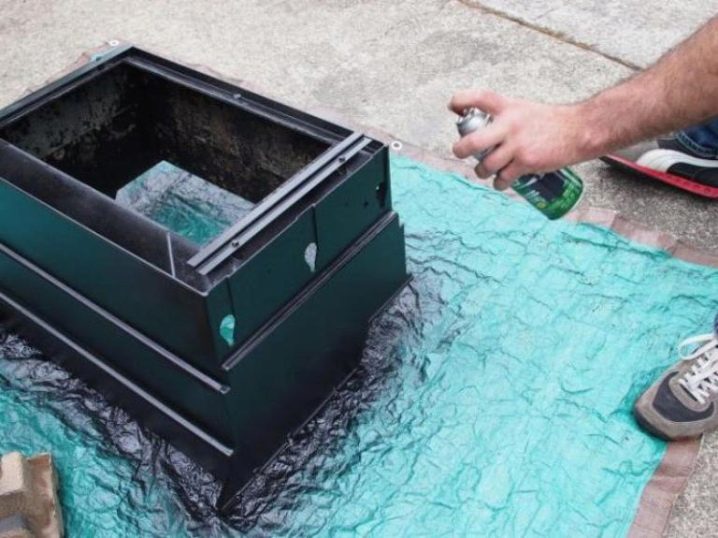
The main disadvantage of all aerosol paints, including high-temperature paints, is their easy flammability and toxicity. Therefore, their use implies the use of protective clothing, gloves and a respirator. And the work must be carried out with the strictest observance of all fire safety rules.
Alternative Methods for Protecting Metals
Another option for protecting a grill or barbecue can be metal oxidation or bluing. The technology of this process consists in processing metal with solutions of acids, alkalis and other reagents. As a result of this process, the top layer of the material changes its structure.A protective film appears on it, which not only renews the surface, but also additionally protects against destruction.
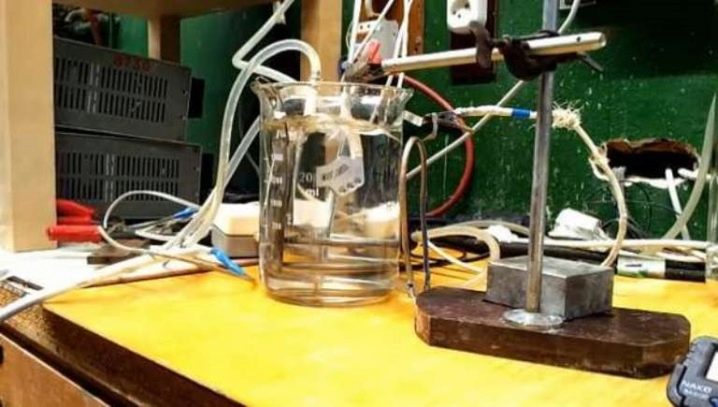
Until recently, this method of processing metal products was available mainly using production equipment. A forged or welded brazier can still be processed in this way only in an industrial enterprise. This process takes place in several stages and requires the use of a large number of chemical solutions and containers of impressive size.
If you are the owner of a collapsible design, then it is quite possible to perform oxidation at home. The work consists in applying a special composition to the metal surface, under the influence of which the color and properties of the material change. The technology is somewhat different from the industrial one, but the end result will be almost the same.
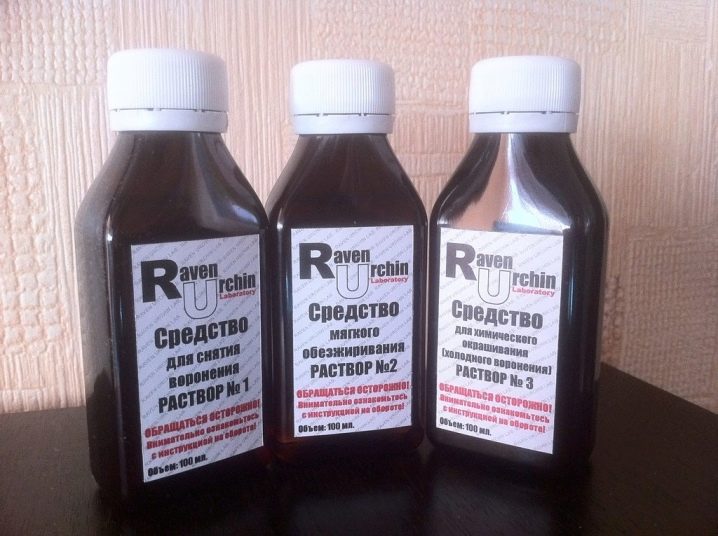
All special refractory paints and varnishes are quite expensive. But the costs of their purchase justify themselves during the operation or long-term storage of barbecues, grills, braziers and other similar equipment. They help to reliably protect the metal from high temperatures, adverse environmental factors and the appearance of rust. The main thing when choosing a paint for a barbecue is to make sure that it meets all the requirements for the necessary properties and safety.
The use of heat-resistant paint for the barbecue is described in detail in the video.




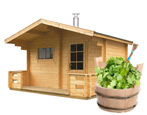
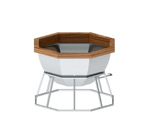
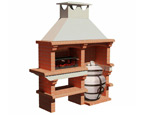
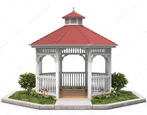
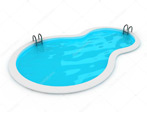
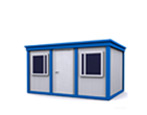

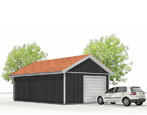
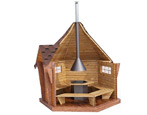
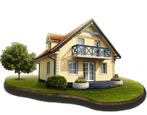
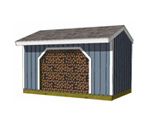
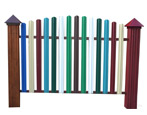
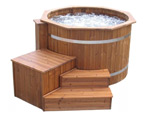
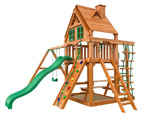
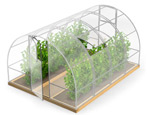
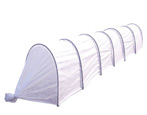
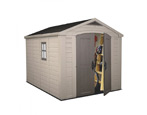
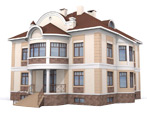







































The comment was sent successfully.